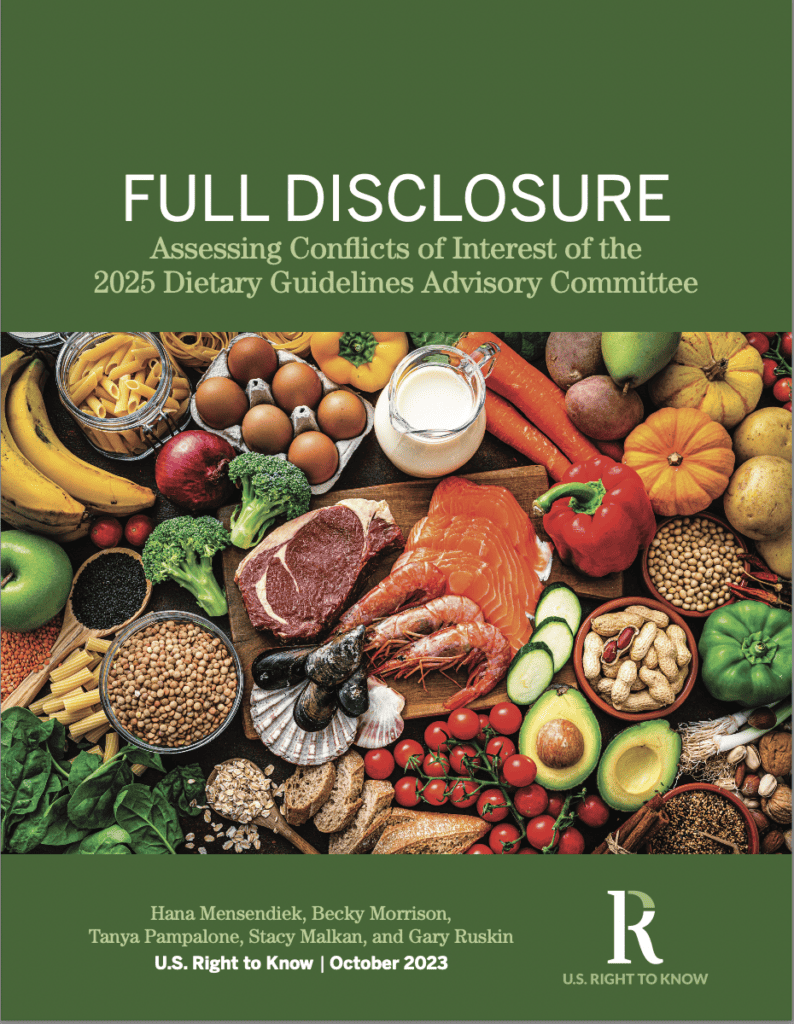Nine out of 20 members of the Dietary Guidelines Advisory Committee have conflicts of interest with food, pharmaceutical or weight loss companies or industry groups with a stake in the outcome of the guidelines, according to a new report published today by the nonprofit public health research group U.S. Right to Know. An additional four members had possible conflicts of interest.
The report found that Abbott, Novo Nordisk, National Dairy Council, Eli Lilly, and Weight Watchers (WW) International had ties to two or more DGAC members.
The DGAC is a panel of food and nutrition experts who make recommendations for updating the U.S. government’s official dietary advice. USRTK compiled publicly available data from the last five years about each of the 20 DGAC members’ ties with industry.
The report concluded that “with high-risk conflicts of interest still present on the DGAC, the public cannot have confidence that the official dietary advice from the U.S. government is free from industry influence.”
The report also noted “encouraging findings,” highlighting that seven DGAC members had no confirmed or possible conflicts in the past five years.
Earlier this year, HHS and USDA issued limited and incomplete disclosures of the 2025 DGAC members’ relationships with industry. These disclosures were aggregated, voluntary, did not identify each individual member’s conflicts, and only covered the last year. Today’s report was an effort to fill in the gaps of the agencies’ flawed disclosure.
The report is titled Full Disclosure: Assessing Conflicts of Interest of the 2025 Dietary Guidelines Advisory Committee (PDF)
The report gives six recommendations to improve the operation of the DGAC. “USDA and HHS should: (1) not appoint members with high-risk conflicts of interest; (2) disclose individual members’ conflicts during the last five years; (3) use a better disclosure form than OGE form 450, due to its confidentiality; (4) publish a list of provisional appointees prior to appointment, open for public comment, as recommended by NASEM; and, (5) include leadership roles or paid roles at conflicted nutrition organizations in disclosures of potential conflicts of interest. Congress should (6) expand the Physician Payments Sunshine Act to cover the nutrition field.”
U.S. Right to Know has co-authored 15 peer-reviewed public health studies revealing how the food and beverage industries and industry-funded groups try to influence public opinion, scientific research, public health conferences and government policies related to diet and nutrition. For more information, see usrighttoknow.wpenginepowered.com.
News coverage of the report
- New York Times: Food Industry Influence Could Cloud the U.S. Dietary Guidelines, a New Report Says; The process of updating the healthy eating recommendations has become more transparent in recent years, but conflicts persist.
- The Guardian: US nutrition panel’s ties to top food giants revealed in new report; Transparency group US Right to Know finds members linked to Nestlé, Coca-Cola and others, raising conflict-of-interest questions
- The BMJ: US dietary committee is plagued with “high risk conflicts of interest,” report finds
- Epoch Times: Report Links Dietary Guidelines Committee to Food and Pharmaceutical Companies; A new report suggests financial conflicts of interests among DGAC may compromise dietary recommendations
- The Hill: Industry ties could muddy US dietary guidelines, watchdog says
- Food Politics: US Right to Know reports on conflicts of interest in members of the 2025 Dietary Guidelines Advisory Committee
- The Young Turks: A report published by the nonprofit U.S. Right to Know shows how corrupt federal dietary are. Ana Kasparian discusses on The Young Turks
Full PDF of the report is here










